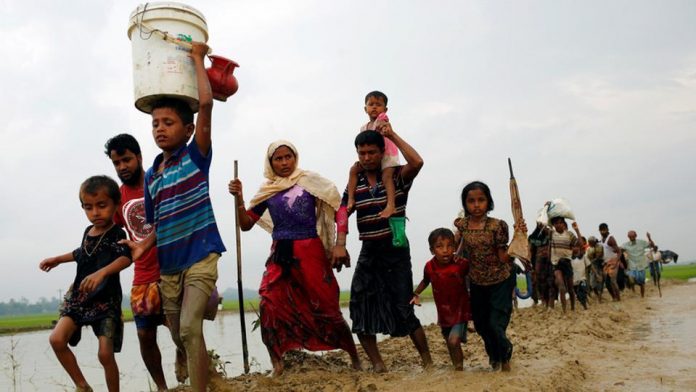Madrid, (IANS): Médecins Sans Frontiéres (MSF) or Doctors Without Borders on Monday urged Myanmar to grant international humanitarian organisations unrestricted and independent access to the conflict-torn Rakhine state to enable provision of humanitarian assistance to the hundreds of thousands of internally displaced people.
The MSF appeal comes amid an ongoing military offensive in Rakhine that was launched on August 25 after the Arakan Rohingya Resistance Army (ARSA) mounted fresh attacks on multiple government posts in the region that led to over 400,000 Rohingyas fleeing to neighbouring Bangladesh.
“The remaining population in northern Rakhine, thought to be hundreds of thousands of people, is without any meaningful form of humanitarian assistance,” the MSF was quoted as saying in a statement by Efe news.
According to the statement, in central Rakhine, around 120,000 internally displaced people (IDPs) remain in camps where they are entirely dependent on humanitarian assistance for their survival, owing to restrictions on their movements.
The statement added that MSF used to provide mobile clinics in several of these camps and villages “but international staff have not been granted travel authorisations to visit the health facilities since the end of August, whilst national staff have been too afraid to go to work following remarks by Myanmar officials accusing NGOs of colluding with ARSA”.
Moreover, according to Benoit De Gryse, MSF’s operations manager for Myanmar, the government’s desire to exclusively provide humanitarian assistance in Rakhine “is likely to result in even more severe administrative and access constraints than ever”.
The Army offensive in Rakhine has been condemned globally by human rights organisations.
Rohingyas are not recognised as citizens by Myanmar although more than a million of them have lived in the country through generations, facing growing discrimination, including severe restrictions on their freedom of movement, following a sectarian conflict in 2012 that killed at least 160 people, and displaced nearly 120,000.
Meanwhile, the United Nations Human Rights Council is set to discuss human rights violations in Myanmar and determine if an “ethnic cleansing” of the Rohingya minority is underway in the country.


